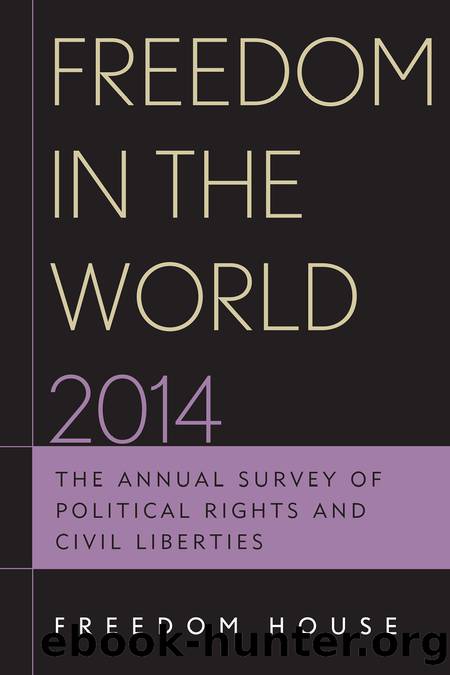Freedom in the World 2014 by Freedom House;

Author:Freedom House;
Language: eng
Format: epub
Publisher: Rowman & Littlefield Unlimited Model
Published: 2014-11-18T14:59:36+00:00
Rating
4,4,PF
4,4,PF
4,4,PF
4,4,PF
4,4,PF
4,4,PF
4,4,PF
4,4,PF
4,4,PF
4,4,PF
Introduction
In 2013, the ruling Barisan Nasional (BN) coalition used a combination of economic rewards, and continued harassment of opposition leaders to ensure victory in the general elections on May 5. The BN won a minority of the popular vote, but took 60 percent of the seats in Parliament, and 10 out of 13 state governments.
The BN government has engaged in suppressing political opposition and dissent. In October, Parliament passed legislation that allows indefinite detention of suspects without trial. Critics argued that the provision was a bid to re-impose the most draconian elements of the Internal Security Act (ISA), which was repealed in 2012. Also in October, an appeals court ruled that non-Muslims cannot use the term âAllahâ to refer to God which impacts freedom of speech and freedom of worship for all non-Muslims in Malaysia. In 2013 we also saw increasing attacks on Shiite practitioners, houses of Shiite adherents were raided, and the Youth wing of UMNO called on the government to amend the constitutionâs definition of Islam to specify Sunni Islam as the official religion. There was also increased government pressure on news media. The weekly publication The Heat was issued a âshow causeâ letter for an article on the prime minister and his wifeâs financial status. The publication was ordered to cease publishing on December 19. The LGBT community also faced increasing harassment from state and national government offices.
Political Rights: 19 / 40 (-1)
A. Electoral Process: 6 / 12
The leader of the coalition that wins a plurality of seats in legislative elections becomes prime minister. Executive power is vested in the prime minister and cabinet. The paramount ruler, the titular head of state, is elected for five-year terms by fellow hereditary rulers in 9 of Malaysiaâs 13 states. Tuanku Abdul Halim Muâadzam Shah was elected to the post in December 2011. The upper house of the bicameral Parliament consists of 44 appointed members and 26 members elected by the state legislatures, serving three-year terms. The lower house, with 222 seats, is popularly elected at least every five years.
The Election Commission (EC) is frequently accused of manipulating electoral rolls and gerrymandering districts to aid the ruling coalition, and the Registrar of Societies arbitrarily decides which parties can participate in politics. The first-past-the-post voting system also increases the power of the largest grouping. In April 2012, a government committee issued recommendations for electoral reforms, many of which had been called for by the Coalition for Free and Fair Elections (Bersih)âan alliance of civil society organizations working for electoral reforms, transparency in government, and an end to corruption. However, there was widespread skepticism that the existing EC could be trusted to implement the recommended changes. For example, one change implemented was the use of indelible ink to mark who had already voted; however, some voters and electoral watchdog groups charged that this ink was easily washed off.
The
Download
This site does not store any files on its server. We only index and link to content provided by other sites. Please contact the content providers to delete copyright contents if any and email us, we'll remove relevant links or contents immediately.
| General | Men's Sexual Health |
| Women's Sexual Health |
Come as You Are by Emily Nagoski(4001)
The Evolution of Beauty by Richard O. Prum(2569)
The Happy Hooker by Xaviera Hollander(2293)
The Clitoral Truth: The Secret World at Your Fingertips by Rebecca Chalker(2269)
The Psychology of Human Sexuality by Lehmiller Justin J(2213)
The Book of Questions: Revised and Updated by Gregory Stock Ph.d(2161)
Women on Top by Nancy Friday(2153)
The Modern Alpha Male: Authentic Principles to Become the Man You Were Born to Be: Attract Women, Win Friends, Increase Confidence, Gain Charisma, Master Leadership, and Dominate Life - Dating Advice by Patrick King(1852)
The Coregasm Workout by Debby Herbenick(1843)
The Ultimate Guide to Anal Sex for Women by Tristan Taormino(1773)
She-ology by Sherry A. Ross MD(1714)
101 Nights of Great Sex by Laura Corn(1711)
The Hite Report on Shere Hite by Shere Hite(1680)
Orgasm mini book by Susan Bakos(1552)
The Ultimate Guide to Fellatio by Violet Blue(1539)
A Round-Heeled Woman by Jane Juska(1538)
The Alchemy of Sexual Energy by Mantak Chia(1505)
The Penis Book by Aaron Spitz(1459)
The Sexual Ecstasy Workbook by Margot Anand(1302)
